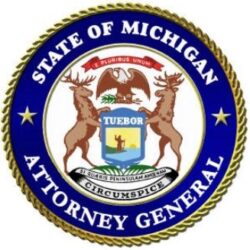
AG Files Brief Challenging the Federal Government

Media Contact: Courtney Covington FOR IMMEDIATE RELEASE: Attorney General Nessel Files Brief
|


Media Contact: Courtney Covington FOR IMMEDIATE RELEASE: Attorney General Nessel Files Brief
|
|
|||
|
|||
|

June 18, 2020

Weather across Michigan has been great in recent days – mostly warm, sunny and dry. But that means a higher risk of wildfires.
Most areas in the northern Lower Peninsula and the Upper Peninsula currently are at elevated fire risk, and that is expected to continue through the weekend. The Michigan Department of Natural Resources says permits for burning yard debris will be restricted, though campfires are still allowed.
“While there is a chance of rain over the weekend, it’s important to know the current risks and keep up to date on restrictions,” said Don Klingler, Lower Peninsula resource protection manager with the DNR’s Forest Resources Division.
Burn permits are required statewide. Residents in the northern Lower and Upper peninsulas can get permission to burn by visiting Michigan.gov/BurnPermit. Elsewhere, contact your local municipality or fire department.
So far this season, DNR fire staffers have fought more than 130 fires on nearly 600 acres.
To further reduce the risk of fire:
Looking ahead, state park campgrounds across Michigan open June 22. The DNR reminds campers that campfires are permitted only in designated fire rings; it’s best to purchase firewood at your destination, rather than bring firewood from home; and aerial fireworks and sky lanterns are not permitted at state park campgrounds.
Also, in a continued effort to slow the spread of COVID-19, anyone working outside this weekend is urged to practice safe social distancing of 6 feet or more when with others who live outside their households.

Waterford, Michigan – Oakland County Michigan Works! today announced the launch of its Summer Young Professionals Program, which gives eligible young people ages 18-24 the opportunity to earn a free industry-recognized certification for an in-demand job, a cash bonus and a laptop computer upon certification.
“Youth programs such as this are so important to our long-term workforce development strategy in Oakland County,” said Oakland County Executive David Coulter. “The goal is to continually fuel the talent pipeline with qualified individuals of all ages to help meet the workforce needs of our employers across various industries in our region.”
The program, which begins this month and runs through December, offers tuition-free certificate training programs for the following jobs:
*Source: O*Net
Eligibility is based on a several factors and will be determined on a case-by-case basis. The certification programs require a commitment of approximately 20 hours per week for 8-14 weeks, depending on the certificate track. All work is completed online. Participants are required to complete three career readiness courses online, choosing from the following topics: resume development, interview skills, job search skills and financial literacy.
As an added incentive, participants receive a free laptop computer, which is theirs to keep upon successful completion of their program. In addition, a monetary bonus of up to $1,100 is provided to participants who earn a certification.
“A lot of young people are looking for ways to gain an edge in today’s job market, so we’re very excited to be able to offer these no-cost certificate training programs completely online,” said Jennifer Llewellyn, director of Oakland County Michigan Works! “We think this will be a very attractive option for eligible persons to secure necessary training in a number of in-demand positions.”
For more information or to apply, go to www.OakGov.com/YoungProfessionals.
Once a completed application is received, a youth coordinator from Oakland County Michigan Works! will contact the applicant, typically within 48 hours.
Oakland County Michigan Works! operates service centers in Novi, Oak Park, Pontiac, Southfield, Troy and Waterford. Combined, they assist more than 105,000 job seekers annually. Services include career coaching, interviewing workshops, job search workshops, placement assistance, training courses and job trend information.
Service centers also assist more than 3,000 employers seeking assistance with talent recruitment, apprenticeship programs, job fairs, candidate pre-screening, hiring and training support, layoff support and labor market data.
Service center staffs remain available by virtual appointment to work one-on-one with job seekers to build their resumes, prepare for job interviews and help address other needs. To schedule a virtual meeting, contact the nearest Oakland County Michigan Works! service center at 1-248-858-5520. The centers also are hosting several virtual workshops for job seekers. A schedule can be found at www.OaklandCountyMIWorks.com.
June 19, 2020

Earlier this month, the Department of Natural Resources announced that camping, overnight lodging facilities and day-use shelters in Michigan state parks and recreation areas will reopen Monday, June 22. Since then, DNR parks and recreation staff have reported some repeated questions from customers. Here’s a look at the top three questions (and answers):
Starting Monday, June 22, yes. The required Recreation Passport – normally needed for vehicle entry to state parks, state forest campgrounds and state-managed boating access sites – had been suspended the past three months in order to minimize face-to-face interactions and the exchange of money between visitors and staff – precautions aimed at reducing the spread of the coronavirus.
Residents can purchase the passport when renewing license plates through the Secretary of State (for $12) or when visiting a state park (for $17). Out-of-state visitors can purchase the passport online or at state parks for $34 (annual pass) or $9 (daily pass).
At most locations, yes. Many state park amenities initially were closed due to COVID-19 public health and safety concerns, but now have reopened or are in process of reopening by June 22. Such amenities include bathroom buildings, hand-washing stations, sanitation stations, trash services, concessions, playgrounds, viewing platforms, fishing piers, sports areas, designated dog areas, picnic tables and shelters. Drinking fountains will remain closed until further notice.
Certain amenities at a handful of locations remain closed due to delayed construction projects. For information about a certain park, call that park’s main number or visit its Facebook page (where available). More information is available on the DNR’s COVID-19 response page.
Additionally, the DNR has developed new operational and sanitation procedures to ensure the safety of visitors, volunteers and staff. Some procedures – like checking in visitors, processing transactions and cleaning facilities – will look a little different and may vary by location. For example, visitors are encouraged to pay by debit or credit card to decrease the exchange of money.
Yes. Modifications to camping, overnight lodging facilities and day-use shelter reservations can be made by contacting the reservation center online at MiDNRReservations.com or calling 800-447-2757 (800-44-PARKS). Please note that the modification and cancellation policy can be found online. The DNR also has waived reduced-stay fees (percentage penalty) through Oct. 31, 2020.
There are still opportunities to book a stay in nearly all DNR facilities this summer and into fall. Reservations for campsites and harbor slips can be made up to six months in advance of a planned arrival date, or 12 months in advance for overnight lodging facilities and day-use shelters.
Finally, all visitors are reminded that everyone still needs to do their part to protect themselves and others while enjoying the outdoors. Practice proper social distancing when around people who are not part of your household, and wear a face covering when in an enclosed indoor space.
/Note to editors: Accompanying photos of various activities at state parks are available below for download./